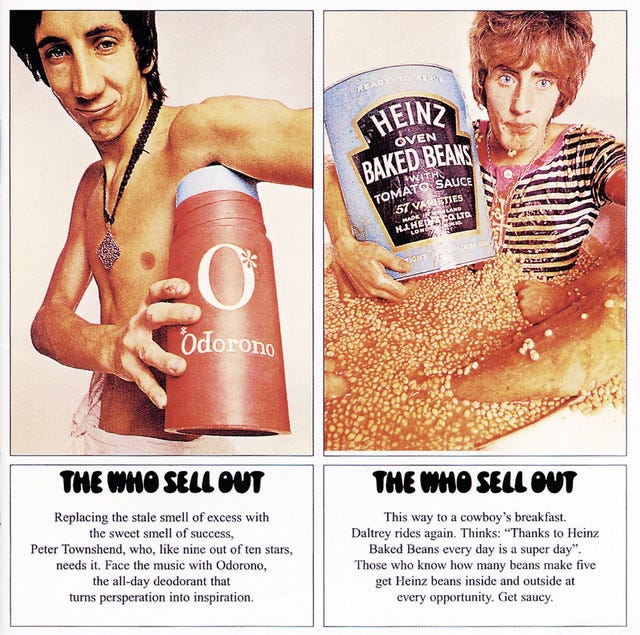Genre of the Day - Freakbeat
Album of the Day - The Who Sells Out by The Who (1967)
Tinashe’s “Nasty” became one of the most viral rallying cries of 2024—the vast algorithmic sea does not seem to be matching us to people who can truly match our freaks, which I theorize partly explains the song’s virality. Is somebody gonna match my freak is far from rhetorical. It is an aspiration that even our greatest desires are satiable, by something, someone, somewhere. Never mind that the song really does have a freaky little beat, one that oscillates between off-kilter minor key dubbiness and propulsive maximalism on the chorus, tantalizing and shape-shifting through darkness and light. Similar musical instincts informed a bunch of British loons in the late ‘60s.
After having spent all day hyperfocused on producing one of the longest papers of my college tenure so far, my writing itself threatens to freak it, which is to say I’m surprised that there isn’t unfettered gibberish spilling onto this Google Doc right now. Perhaps an object in motion truly does stay in motion. But what genre is more outlandish and perfect for a bit of nonsense? Rock was getting considerably stranger in Britain by the mid-’60s, spearheaded obviously by the chromatic turns and sonic experimentations of the Beatles and a general mod flair for the absurd as new cultural and artistic discourses swung the successes and strangeness of post-WWII British life into fashionable, colorful treatises on modernity and cosmopolitanism.
Freakbeat freaked the beat further and freakier than any other musical movement in this environment, vividly synthesizing emergent techniques and thematics of nascent psychedelia with mod and pop sensibilities. Acts like The Creation, The Who, and The Yardbirds probed new guitar horizons, flanging, fuzzing, and modulating their way through hitherto unobserved sonic landscapes, setting precedent for later hard rock movements. One measure of freakbeat defines it as being “touched by the hand of mayhem.” It’s a vibrant chapter in a storied history of British musical adventurism like Canterbury scene’s humorous prog-rock or ska-revivalist moments like 2 tone. Freakbeat was an ephemeral moment, perhaps too freaky to last, and didn’t even have a cohesive genre name in its moment.
As mod/art-rock icons, The Who were more willing than most to go to great lengths to freak it and make an impression, whether pantomiming the literal act of selling out through a concept album as bold as the one we’re covering today or smashing the musical equipment on stage after a show. From the prescriptive, starry-eyed wa-wa wisdom of “Armenia City in the Sky,” guitars racing side-to-side to the advertisements like “Medac” so slickly slotted in one may not even notice, they sell a dream that only a considerable degree of musical inventiveness could have conjured up to interpret the surreal commercialism intensifying in their moment of industrialized music. Beyond concept (my brain could really only absorb so much about the music industry, also the subject of my paper, today), their craftsmanship stands out in the faint Latin-folk twinges of “Mary Anne with the Shaky Hand” and the stunning, evocative guitar intricacy of “Sunrise.” Being a wannabe sellout never sounded so good, though nothing will ever compel me to purchase a can of baked beans.




